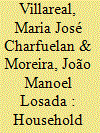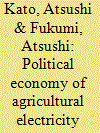| Srl | Item |
| 1 |
ID:
149989


|
|
|
|
|
| Summary/Abstract |
This article describes the electricity consumption in Brazilian residences between 1985 and 2013 through linear regressions. The explanatory variables considered were the number of households, effective consumption of families as a proxy for family income, and electricity tariff for households. To deal with the power generation crisis of 2001 we have introduced a dummy variable in the form of a step function. With such explanatory variables, we were able to account for the reduction of household electricity consumption caused by the policies conducted in 2001 and their permanent consequences. The regression presented coefficient of determination of 0.9892, and the several statistic tests conducted assured the existence of long-term relation between the electricity consumption in residences and the explanatory variables. The obtained elasticities for the household consumption of electricity with respect to number of residences, family income and residential tariff of electricity were 1.534±0.095, 0.189±0.049, and −0.230±0.060, respectively. These results allowed understanding the evolution over time of the household consumption of electricity in Brazil. They suggest that the electric sector in Brazil should pursue an active policy to manage demand of residential electricity using tariffs as a means to control it.
|
|
|
|
|
|
|
|
|
|
|
|
|
|
|
|
| 2 |
ID:
132576


|
|
|
|
|
| Publication |
2014.
|
| Summary/Abstract |
Electricity prices in Brunei are highly subsidized, placing a heavy fiscal burden on the government budget. Prior to 1 January 2012, the primary electricity tariff in the residential sector was based on a Declining Block Tariff structure, and non-poor households enjoyed a disproportionately large share of total electricity subsidies. The government has since implemented a new electricity tariff in the residential sector based on an Increasing Block Tariff. The main objective of this paper is to evaluate the welfare impact for households. It is estimated that about 80 per cent of households benefit from the new tariff, with poor households enjoying a larger percentage gain compared to the old tariff. However, total electricity subsidies remain roughly unchanged under the new tariff; in addition, non-poor households continue to enjoy a substantial proportion of the subsidies. There is still much to be done to tackle the high fiscal costs of subsidies and the problem of distribution distortion.
|
|
|
|
|
|
|
|
|
|
|
|
|
|
|
|
| 3 |
ID:
190616


|
|
|
|
|
| Summary/Abstract |
The shortfall of the feed-in-tariff (FiT) mechanism led to net metering and net billing, seen as the comprehensive instrument for developing electricity prosumption globally. Following the global trend, Ghana has adopted net metering for its electricity sustainability development. Despite adopting the net metering scheme in Ghana, prosumption faces many challenges. The paper explores the key factors influencing prosumer deployment in Ghana from policy, regulatory and people's perspectives and suggests a better pathway for Ghana's prosuming path. This study reveals several challenges that prosumers face that discourage many people from investing in photovoltaic installations in Ghana. Among the challenges are policy and regulatory gaps, inelastic electricity tariff structure and the unwillingness of distribution system operators to accept prosumers into the grid with the perception of losing the prosumers as consumers.
|
|
|
|
|
|
|
|
|
|
|
|
|
|
|
|
| 4 |
ID:
174961


|
|
|
|
|
| Summary/Abstract |
Although electricity is one of the most important determinants of successful industrialization, many countries do not provide sufficient amounts of electricity at reasonable prices for industrialization. In order to inquire into the causes behind this, we investigate the factors that influence electricity tariffs for agricultural consumers at the state level in India. We conduct a dynamic panel data analysis using data for seventeen major states in India for the period from 1992 to 2012. Our estimation results suggest that as the Gini coefficient of landowning rises, the agricultural electricity tariffs become lower. However, the rural population share does not significantly affect agricultural electricity tariffs. These results indicate that state governments are responsive to the demands of large farmers (rural elites) but not to the demands of farmers more generally (rural masses). Our results are consistent with elite politics but not mass politics. Low electricity tariffs for agricultural consumers have caused insufficient investment in the infrastructure necessary for the expansion of industries, as well as high electricity tariffs for industrial consumers, which may have adversely affected the industrialization of state economies in India.
|
|
|
|
|
|
|
|
|
|
|
|
|
|
|
|